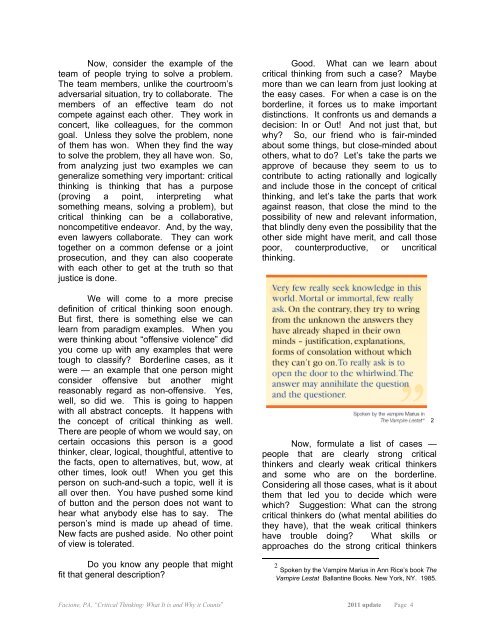Critical Thinking for Transformative Justice
Critical Thinking for Transformative Justice
Critical Thinking for Transformative Justice
You also want an ePaper? Increase the reach of your titles
YUMPU automatically turns print PDFs into web optimized ePapers that Google loves.
Now, consider the example of the<br />
team of people trying to solve a problem.<br />
The team members, unlike the courtroom’s<br />
adversarial situation, try to collaborate. The<br />
members of an effective team do not<br />
compete against each other. They work in<br />
concert, like colleagues, <strong>for</strong> the common<br />
goal. Unless they solve the problem, none<br />
of them has won. When they find the way<br />
to solve the problem, they all have won. So,<br />
from analyzing just two examples we can<br />
generalize something very important: critical<br />
thinking is thinking that has a purpose<br />
(proving a point, interpreting what<br />
something means, solving a problem), but<br />
critical thinking can be a collaborative,<br />
noncompetitive endeavor. And, by the way,<br />
even lawyers collaborate. They can work<br />
together on a common defense or a joint<br />
prosecution, and they can also cooperate<br />
with each other to get at the truth so that<br />
justice is done.<br />
We will come to a more precise<br />
definition of critical thinking soon enough.<br />
But first, there is something else we can<br />
learn from paradigm examples. When you<br />
were thinking about “offensive violence” did<br />
you come up with any examples that were<br />
tough to classify? Borderline cases, as it<br />
were — an example that one person might<br />
consider offensive but another might<br />
reasonably regard as non-offensive. Yes,<br />
well, so did we. This is going to happen<br />
with all abstract concepts. It happens with<br />
the concept of critical thinking as well.<br />
There are people of whom we would say, on<br />
certain occasions this person is a good<br />
thinker, clear, logical, thoughtful, attentive to<br />
the facts, open to alternatives, but, wow, at<br />
other times, look out! When you get this<br />
person on such-and-such a topic, well it is<br />
all over then. You have pushed some kind<br />
of button and the person does not want to<br />
hear what anybody else has to say. The<br />
person’s mind is made up ahead of time.<br />
New facts are pushed aside. No other point<br />
of view is tolerated.<br />
Do you know any people that might<br />
fit that general description?<br />
Good. What can we learn about<br />
critical thinking from such a case? Maybe<br />
more than we can learn from just looking at<br />
the easy cases. For when a case is on the<br />
borderline, it <strong>for</strong>ces us to make important<br />
distinctions. It confronts us and demands a<br />
decision: In or Out! And not just that, but<br />
why? So, our friend who is fair-minded<br />
about some things, but close-minded about<br />
others, what to do? Let’s take the parts we<br />
approve of because they seem to us to<br />
contribute to acting rationally and logically<br />
and include those in the concept of critical<br />
thinking, and let’s take the parts that work<br />
against reason, that close the mind to the<br />
possibility of new and relevant in<strong>for</strong>mation,<br />
that blindly deny even the possibility that the<br />
other side might have merit, and call those<br />
poor, counterproductive, or uncritical<br />
thinking.<br />
Now, <strong>for</strong>mulate a list of cases —<br />
people that are clearly strong critical<br />
thinkers and clearly weak critical thinkers<br />
and some who are on the borderline.<br />
Considering all those cases, what is it about<br />
them that led you to decide which were<br />
which? Suggestion: What can the strong<br />
critical thinkers do (what mental abilities do<br />
they have), that the weak critical thinkers<br />
have trouble doing? What skills or<br />
approaches do the strong critical thinkers<br />
2 Spoken by the Vampire Marius in Ann Rice’s book The<br />
Vampire Lestat Ballantine Books. New York, NY. 1985.<br />
2<br />
Facione, PA, “<strong>Critical</strong> <strong>Thinking</strong>: What It is and Why it Counts” 2011 update Page 4

















